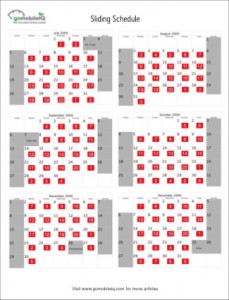Monthly deliveries committing perjury
Many of our clients use a monthly delivery schedule. Surprisingly, that doesn’t necessarily mean the customer gets only one delivery or service call each month. It depends on the specific delivery system being used. Accounts might get serviced twice in a particular month. Those extra deliveries are confusing and means their monthly invoice could suddenly double. Which often means an angry call to customer service.
Here’s a way around all that.
It requires a little background knowledge, so let’s cover that first. Two popular delivery systems are fixed schedule and sliding schedule.
Fixed Schedule
This system guarantees only one delivery per month. The customer is scheduled one of two ways: using a specific date or using a specific day. For example, the “15th of every month” or the “2nd Tuesday of every month.”

There’s two significant problems with this approach.
- Pint-sized February holds back all the longer months. Since Feb. 30th doesn’t exist, the schedule can’t say the “30th of every month”. And the “5th Tuesday of every month” won’t always work. That often leaves too much month at the end of every delivery cycle.
- The other problem is holidays. It’s tough to make deliveries when the office is closed and everyone’s out shooting off fireworks or grilling burgers. Most companies using a fixed schedule will “double-up” during holidays weeks. That means making five days of deliveries in only four days every time a holiday rolls around. Tough job for anyone. Thanksgiving and Xmas are particularly grueling and it might take 2-3 weeks to catch up with all the late deliveries.
Sliding Schedule (aka “bump” schedule or “cycle” schedule)
This system takes an entirely different approach.
Instead of using calendar days, the company selects a “cycle” of delivery days that continually repeat. Let’s say a 20 day cycle is used (10 and 20 day cycles are common). The numbers 1 through 20 are used to represent unique route days. A driver will deliver all the customers on Route 1. The following day, all the customers on Route 2 are delivered. The third day, all the customers on Route 3. And so on until Route 20 is finally completed. Then it’s back to Route 1 and the process continues.
The clever part is how these days are mapped to the calendar. On the calendar below, the red numbers are the cyclical route days. By skipping over weekends and holidays (gray squares), all the problems with using a Fixed Schedule are avoided. Everyone’s happy.

Well, sort of. We still haven’t solved the “more than one delivery each month” issue. There’s another option when it’s important that “monthly service” means “exactly one time per month”.
Sliding Guaranteed Schedule
This variation of the standard “Sliding Schedule” adds closed days at the end of each month. The trick here is closed days are only added when needed. Exactly twenty delivery days appear in each month. July, October and December are all rather long-ish months. Each receives two additional closed days. August and September only need one. And for 2009, November doesn’t need any.

This systems guarantees three things:
- Monthly customers only receive one delivery each month. Same is true for 2x and 4x customers.
- Holiday weeks are treated no differently. No doubling up, working weekends or paying overtime.
- Route day volumes remain consistent throughout the entire month. That helps balance revenue.
Are there drawbacks to this system? Sure.
Less route days are available during the year because you’re really taking 13x annually and converting to 12x annually for some customers. Depending on the number of holidays, about ten revenue generating days are pushed into next year. The fixed schedule claims to avoid this issue, but I’m convinced the cost of “doubling-up” offsets that extra income. Companies using a sliding schedule believe the value of fewer complaints, less overtime and overall simplicity outweighs the potential lost revenue. And keep in mind, your company can use a mix of these different schedules for different customers.
Thanks to Brian Kennedy @ Culligan of Plant City for posing the question.
Tags: prescheduled
